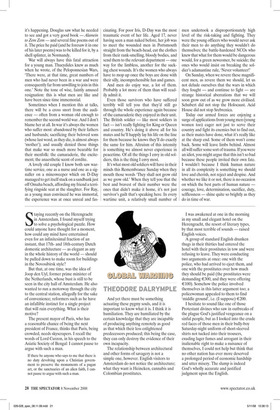S taying recently on the Herengracht in Amsterdam, I found myself
trying to solve a psychological puzzle. How could anyone have thought for a moment, how could any mind have entertained even for an infinitesimal fraction of an instant, that 17thand 18th-century Dutch domestic architecture — as elegant as any in the whole history of the world — should be pulled down to make room for buildings in the Novosibirsk style?
But that, at one time, was the idea of Joop den Uyl, former prime minister of the Netherlands, whose bust is still to be seen in the city hall of Amsterdam. He also wanted to run a motorway through the city to the central station, allegedly for the sake of convenience; reformers such as he have an infallible instinct for a single project that will ruin everything. What is their motive?
The present mayor of Paris, who has a reasonable chance of being the next president of France, thinks that Paris, being crowded, needs skyscrapers. I recall the words of Lord Curzon, in his speech to the Asiatic Society of Bengal: I cannot pause to argue with such a man.
If there be anyone who says to me that there is no duty devolving upon a Christian government to preserve the monuments of a pagan art, or the sanctuaries of an alien faith, I cannot pause to argue with such a man.
And yet there must be something actuating these pygmy souls, and it is important to know what it is. I think it is humiliation. They are humiliated by the certain knowledge that they are incapable of producing anything remotely as good as that which their less enlightened predecessors produced; this being the case, they can only destroy the evidence of their own incapacity.
The relationship between architectural and other forms of savagery is not a simple one, however. English visitors to Amsterdam do not notice the architecture; what they want is Heineken, cannabis and Colombian prostitutes. I was awakened at one in the morning in my small and elegant hotel on the Herengracht, the resort of literary types, by that most terrible of sounds — raised English voices.
A group of standard English drunken thugs in their thirties had entered the hotel with their prostitutes in tow and were refusing to leave. They were conducting two arguments at once: one with the police, who had arrived to eject them, and one with the prostitutes over how much they should be paid (the prostitutes were demanding €300, and they were offering €100). Somehow the police involved themselves in this latter argument too; a policewoman appealed to them to find ‘middle ground’, i.e. (I suppose) €200.
I hesitate to sound like one of those Protestant divines who saw in outbreaks of the plague God’s justified vengeance on a sinful people, but as I looked into the crude red faces of those men in their bully-boy Saturday-night uniform of short-sleeved shirts not tucked into their trousers, exuding lager fumes and arrogant in their inalienable right to make a nuisance of themselves, I could not help but think that no other nation has ever more deserved a prolonged period of economic hardship and utter misery. The slump is indeed God’s wholly accurate and justified judgment upon the English.


















































































 Previous page
Previous page